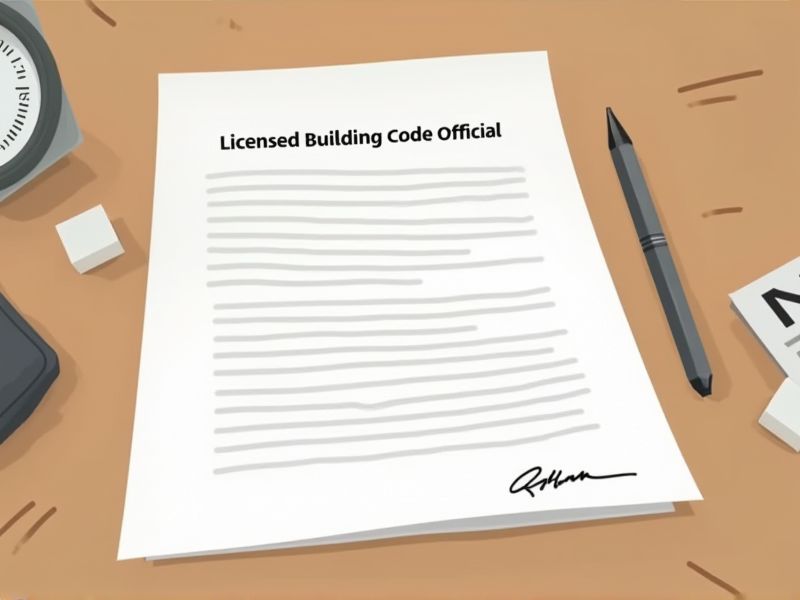
Licensed Building Code Officials play a crucial role in ensuring that construction projects adhere to safety and regulatory standards. Obtaining certain certifications is essential, as these credentials affirm their expertise and capability to enforce building codes effectively. Without proper certification, officials may lack the specialized knowledge required to assess complex building regulations and safety measures. Here are some important certifications you may need for a Licensed Building Code Official.
ICC Certified Building Official (CBO)
Having an ICC Certified Building Official (CBO) ensures comprehensive understanding of national and international building codes, leading to improved construction safety and compliance. The CBO certification reflects a standard of expertise and credibility, which bolsters public trust and reduces liability for licensed building code officials. A CBO's proficiency in interpreting and applying codes minimizes project errors and delays, enhancing efficiency and cost-effectiveness. Consistent compliance with evolving building regulations directly correlates with sustainability and resilience in constructed environments.
ICC Residential Building Inspector Certification
The ICC Residential Building Inspector Certification ensures a comprehensive understanding of residential building codes, which enhances the credibility of a Licensed Building Code Official. Obtaining this certification demonstrates a commitment to maintaining the highest standards of safety and compliance in construction projects. With this credential, officials can better identify potential code violations, reducing risks and liabilities associated with residential buildings. The certification provides up-to-date knowledge of code changes, enabling more accurate and efficient inspections.
ICC Commercial Building Inspector Certification
The ICC Commercial Building Inspector Certification provides verification of comprehensive knowledge of construction codes, which is essential for effective enforcement of building regulations. Holding the certification ensures that a Licensed Building Code Official can competently assess compliance, minimizing safety hazards and structural risks. Certification demonstrates commitment to professional standards, enhancing the credibility and trustworthiness of an individual in the field. Continuous education and examination requirements for the certification help maintain up-to-date knowledge, crucial for adapting to evolving building practices and codes.
ICC Plumbing Inspector Certification
The ICC Plumbing Inspector Certification enhances a Building Code Official's ability to enforce plumbing codes, which leads to safer and more efficient building practices. The certification ensures a comprehensive understanding of the latest plumbing standards, reducing the risk of costly and dangerous plumbing errors. It validates an official's expertise, fostering trust and credibility with stakeholders, including builders and the public. Certification requirements often align with continuing education, helping officials stay updated with evolving industry regulations and technological advancements.
ICC Mechanical Inspector Certification
The ICC Mechanical Inspector Certification ensures that a Licensed Building Code Official possesses comprehensive knowledge of mechanical systems and compliance with codes. This certification enhances their credibility and trustworthiness when overseeing building projects and ensuring safety standards. Equipped with the certification, officials can effectively identify and address potential mechanical issues before they become significant problems. It fosters consistency and uniformity in code enforcement practices, leading to higher construction quality and safety.
ICC Fire & Life Safety Inspector Certification
The ICC Fire & Life Safety Inspector Certification ensures building code officials possess a standardized knowledge of fire safety regulations, leading to enhanced safety compliance. Certification verifies an official's capability to identify potential fire hazards, which can prevent costly incidents and safeguard public welfare. As codes and regulations frequently evolve, this certification helps licensed officials stay updated with the latest standards, fostering consistent enforcement. Having certified inspectors boosts public confidence in the safety of built environments.
ICC Electrical Inspector Certification
The ICC Electrical Inspector Certification provides a structured understanding of electrical codes, ensuring that Licensed Building Code Officials are equipped with the knowledge to enforce safety standards. By obtaining this certification, officials can more effectively inspect electrical installations and prevent potential electrical hazards in buildings. The certification establishes credibility and enhances the official's capability to interpret and apply complex electrical requirements. Certification often influences professional growth and career opportunities within building code enforcement roles.
NFPA Certified Fire Protection Specialist
Ensuring a building's compliance with fire safety regulations requires a deep understanding of fire protection systems, which a NFPA Certified Fire Protection Specialist provides. A Licensed Building Code Official often tackles complex safety challenges, making expertise in fire protection crucial for effective solutions. The certification equips officials with knowledge on evolving standards and cutting-edge technology in fire safety. With specialized credentials, these officials enhance their ability to safeguard occupants and optimize building designs against fire hazards.
LEED Accredited Professional (LEED AP)
A LEED Accredited Professional (LEED AP) enhances a Licensed Building Code Official's ability to integrate sustainable building practices into regulatory processes. By understanding LEED standards, they can effectively assess and certify environmentally friendly construction projects, ensuring compliance with green building codes. This expertise supports the reduction of a building's ecological footprint while promoting energy efficiency. Collaboration with architects and developers is improved, facilitating the implementation of sustainable design strategies.
OSHA 30-Hour Construction Safety Certification
OSHA 30-Hour Construction Safety Certification equips a Licensed Building Code Official with in-depth safety knowledge, enabling them to identify and mitigate potential hazards on construction sites. Having this certification ensures the official is well-versed in federal safety standards, which helps in enforcing compliance effectively. The comprehensive training provided by the certification contributes to reducing workplace accidents and injuries, thus fostering a safer construction environment. This credential also enhances the credibility of the official, thereby establishing trust with contractors and construction companies who aim to maintain high safety standards.
Summary
You, as a Licensed Building Code Official, can strengthen your expertise through additional certifications. These certifications can improve your understanding of specialized codes and regulations. Improved knowledge often results in more efficient project approvals and compliance checks. Enhanced credentials may also lead to better career opportunities and professional recognition.
